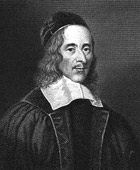George Herbert was born to a noble family in Wales; his mother was patron to John Donne who dedicated his 'Holy Sonnets' to her. He was educated at Westminster School and Trinity College Cambridge, where in 1620 he was elected to the prestigious post of Public Orator.
His first two sonnets were sent to his mother in 1610. On the theme that the love of God is a worthier subject for verse than the love of woman. They foreshadowed his future religious and poetic inclinations, but at first Herbert seemed bent on a secular career, much involved in court life and Member of Parliament for Montgomery in Wales from 1624-5. His only published verse during this period was in Greek and Latin, for formal occasions.
In 1627, however, he resigned as Orator and was ordained a priest, becoming rector at Bemerton in Wiltshire where he was noted for his diligence and humility, traits reflected in his poetry which also expresses the conflict between the religious and worldy life.
When he realised he was dying of consumption, he sent a collection of his poems in manuscript to his friend Nicholas Ferrar to judge whether to burn them or publish them. The result was 'The Temple', religious poems using common language and rhythms of speech, published to enormous popular acclaim and running to 13 editions by 1680.
Also published after his death, in 1652, was 'A Priest to the Temple: Or the Country Parson, his Character and Rule of Life' homely, prose advice to country clerics. |






